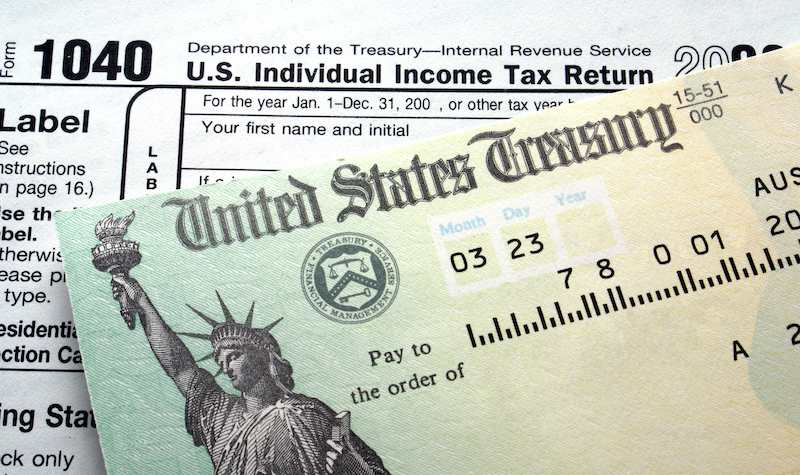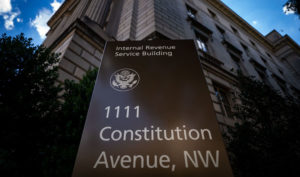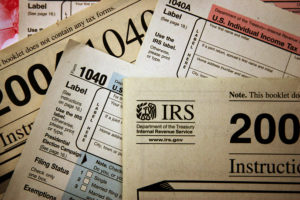
Tax experts discuss income tax law, loopholes, and policy proposals.
$750.
That is how much President Donald J. Trump reportedly paid in federal income taxes each year in 2016 and 2017. Americans with adjusted gross income—the amount of money an individual earns through wages, dividends, capital gains, and other sources minus certain deductions—of around $25,000 typically pay more in federal income taxes than President Trump did in those two years.
How can someone who claims to be worth $8.7 billion pay only $750 in federal income taxes?
Taxation occurs when an authorized entity, typically the government, imposes an involuntary fee as a means of raising money. Taxation exists in the United States at the federal, state, and municipal level. As one tax policy organization states, taxes generally fall into three categories: “taxes on what you earn, taxes on what you buy, and taxes on what you own.”
Federal income tax, as the name suggests, is a federal tax on the income that individuals earn. The federal government derives its general power to tax from Article 1, Section 8 of the U.S. Constitution, which states that “Congress shall have power to lay and collect taxes.” The 16th Amendment, ratified in 1913, further establishes the power to tax income by giving Congress the “power to lay and collect taxes on incomes, from whatever source derived.”
Congress has delegated much of its authority to administer the tax laws to the Internal Revenue Service (IRS). Congress founded the government office that Americans know today as the IRS in 1862 to raise funds to help finance the American Civil War. Since then, income tax rates have fluctuated with different administrations. The Tax Cuts and Jobs Act of 2017, the latest in a litany of American tax legislation, has “helped push the tax rate on the 400 wealthiest households below the rates for almost everyone else.”
This recent tax cut, along with numerous loopholes that allow for the exemption of what might otherwise be taxable income, has allowed individuals such as President Trump to reduce their tax obligations significantly.
Critics point to this seeming inequality as another failure in America’s broken tax system. Although certain taxpayers might continue to boast about being “smart” by exploiting tax laws, some economists urge that a more progressive tax system—a system where higher earners pay a higher tax rate—along with increased enforcement of tax violations, can help “fix tax injustice.”
In this week’s Saturday Seminar, scholars discuss income tax law and proposals to change an imperfect system.
- “America taxes wages, not wealth,” Edward McCaffery of the University of Southern California Gould School of Law writes in the Indiana Law Journal. McCaffery notes that this distinction between wages and wealth has allowed the savvy rich who technically generate little to no annual income to avoid paying income taxes. New tax law proposals from politicians such as U.S. Representative Alexandria Ocasio-Cortez (D-N.Y.) and U.S. Senator Elizabeth Warren (D-Mass.) represent steps in the right direction but still do not fully erase the wages and wealth distinction, he argues. Instead, McCaffery pushes to replace the current income tax structure with a spending tax that “would tax people on what they spend, whether financed by wages or wealth.”
- A wealth tax would apply to an individual’s entire net worth, including bank accounts, stocks, and luxury goods. Some critics argue that such a tax would be unconstitutional because it is a direct tax. All non-income direct taxes must be apportioned based on state population; the federal government cannot collect them directly from the taxpayer. The University of Texas at Austin School of Law’s Calvin H. Johnson, however, argues that wealth taxes are not direct taxes and are exempt from the apportionment requirement. He explains that “wealth taxes were once considered direct taxes” because wealth was “presumed to be equal among the states.” Because that assumption no longer holds, Johnson argues that the founders’ definition of a direct tax does not cover a modern wealth tax. Like an import tax, the Constitution allows the federal government to levy a wealth tax without apportionment, Johnson suggests.
- The tax reform debate focuses too much on economic efficiency and too little on promoting equity, argues James R. Repetti of Boston College Law School in an article published in the Florida Tax Review. Repetti advocates progressive tax structures, which institute a higher tax rate on wealthier individuals and a lower tax rate on poorer individuals, to address wealth inequality. Progressive tax systems promote democracy by “ensuring that the voice of the poor is not entirely eclipsed by the wealthy,” Repetti claims.
- In an article published in the Houston Law Review, Heather M. Field of the University of California Hastings College of Law claims that the term “tax loophole” describes a wide and disparate range of provisions. Field fears that the term’s lack of precision muddies discourse about tax policy. Instead of trying to define the term more precisely, Field argues that the true meaning of “tax loophole” might be uncovered by identifying the normative policy objection and the persons blamed for the issue. Identifying the contextual meaning of “tax loophole” can facilitate meaningful conversations about tax reform, Field claims.
- Most major regulations undergo centralized review by the Office of Management and Budget (OMB) before implementation. Tax regulations, however, do not undergo this review, explains Clinton G. Wallace of the University of South Carolina School of Law. In an article published in the Alabama Law Review, he argues for requiring OMB review for certain categories of tax regulations. For example, when a regulation would allocate private tax revenue for public use, Wallace recommends that OMB review the agency’s estimate of how much revenue the regulation would generate. This review, he claims, would ensure that the agency properly carries out what Congress intended when it gave the agency power to enact the regulation.
- Taxpayers use IRS Form 1040 for personal income tax returns. Jay Soled, tax professor at Rutgers University, and Kathleen DeLaney Thomas, director of the UNC School of Law Tax Institute, discuss in a Boston College Law Review article how Form 1040s are almost always filled out by tax return preparers or software companies. Both operate under “little regulatory oversight,” according to the authors, which allows tax preparation services to exploit the gap between Congress’s goal of maximizing its tax revenue and tax preparers’ attempts to minimize their clients’ tax obligations. To close this tax gap and increase tax compliance, Soled and Thomas argue, Congress should increase oversight of both kinds of tax preparers.
The Saturday Seminar is a weekly feature that aims to put into written form the kind of content that would be conveyed in a live seminar involving regulatory experts. Each week, The Regulatory Review publishes a brief overview of a selected regulatory topic and then distills recent research and scholarly writing on that topic.



